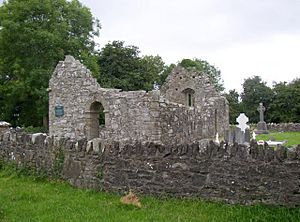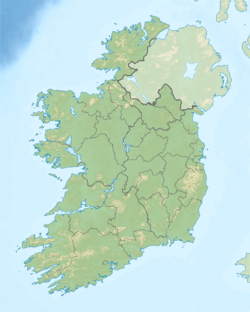Sheepstown Church facts for kids
Quick facts for kids Sheepstown Church |
|
|---|---|
| Ballynageragh | |
|
Cill Bhaile na gCaorach
|
|
 |
|
| 52°29′06″N 7°14′36″W / 52.4849°N 7.243442°W | |
| Location | Sheepstown, Knocktopher, County Kilkenny |
| Country | Ireland |
| Denomination | Church of Ireland |
| Previous denomination | Pre-Reformation Catholic |
| History | |
| Dedication | Saint Muicín |
| Architecture | |
| Functional status | inactive |
| Heritage designation | |
| Official name | Sheepstown Church |
| Reference no. | 73 |
| Style | Hiberno-Romanesque |
| Years built | 12th–13th centuries |
| Specifications | |
| Length | 14 m (46 ft) |
| Width | 6 m (20 ft) |
| Number of floors | 1 |
| Floor area | 62.5 m2 (673 sq ft) |
| Materials | sandstone |
| Administration | |
| Diocese | Ossory |
Sheepstown Church is an old church from the Middle Ages. It is located in County Kilkenny, Ireland. This special building is also known as a National Monument in Ireland. This means it is protected because of its historical importance.
About Sheepstown Church
Where is it?
Sheepstown Church is found about 1.8 kilometers (just over a mile) west of a place called Knocktopher. It's very close to Junction 10 of the M9 road. You can easily spot it if you are traveling on that motorway.
A Look Back in Time
This church is dedicated to a saint named Muicín. He was a bishop and a holy man who lived a very long time ago, around the year 630. The stone church you see today was built much later, sometime between the 12th and 13th centuries.
During that time, the way churches were organized in Ireland was changing. They were moving from being run by groups of monks (called a monastic setup) to being run by bishops in specific areas (called a diocesan setup). Sheepstown Church was built during this important period of change.
What Does it Look Like?
Sheepstown Church is built in a style called Hiberno-Romanesque. This is a type of architecture that was popular in Ireland during the Middle Ages. It often features strong, simple designs.
The church has a main doorway on its west side. This doorway has simple "bead moulding," which means it has decorative patterns that look like small beads. You can also see this bead moulding on the four corners of the church's gables (the triangular parts of the wall at the end of the roof).
There is another door on the south side of the church. This door might have led to a sacristy. A sacristy is a special room in a church where priests prepare for services and where sacred items are kept.
High up in the northwest corner of the church, there is a stone sticking out called a corbel. This particular corbel is known as the "clock-stone." People think it might have been the gnomon of a sundial. A gnomon is the part of a sundial that casts a shadow, telling you the time of day.
 | Jessica Watkins |
 | Robert Henry Lawrence Jr. |
 | Mae Jemison |
 | Sian Proctor |
 | Guion Bluford |


